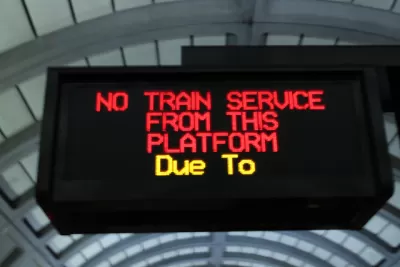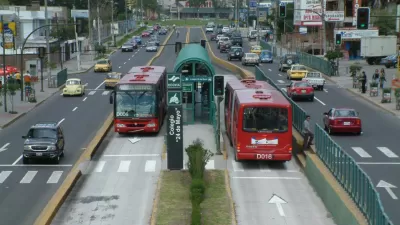Jarrett Walker discusses some reasons why transit authorities can be resistant to change. It all comes down to considering their point of view.

Putting yourself in a transit agency's shoes, says Jarrett Walker, is the best way to understand why they can be slow to change or innovate. Walker goes through a list of factors underlying that conservatism, including:
- Complex federal regulations: "I'm not commenting on the worth of each of these regulations, but can certainly testify to their cumulative impact. I've seen countless situations where elected officials were demanding that something get done fast, and the correct answer was that Federal mandates and processes simply prohibit that."
- Intentionally adversarial labor relations: "Most big cities have progressive elected officials who care about both transit workers and transit riders, but both of those voices have to be strongly present in the conversation, because ultimately they want opposite things."
- Conflicting direction from elected officials: "If you demand both ridership and coverage from your transit agency — and most people do want both — then you're giving contradictory direction, and someone needs to force you to be clearer about what the priorities are."
- A penchant for keeping things running smoothly: "So when some egghead planner shows up wanting to change the transit system, it's easy to see them as just another disruption — not fundamentally different from the car crash blocking the your rail line."
FULL STORY: Why Transit Authorities Sometimes Resist Change

Alabama: Trump Terminates Settlements for Black Communities Harmed By Raw Sewage
Trump deemed the landmark civil rights agreement “illegal DEI and environmental justice policy.”

Study: Maui’s Plan to Convert Vacation Rentals to Long-Term Housing Could Cause Nearly $1 Billion Economic Loss
The plan would reduce visitor accommodation by 25% resulting in 1,900 jobs lost.

Planetizen Federal Action Tracker
A weekly monitor of how Trump’s orders and actions are impacting planners and planning in America.

Waymo Gets Permission to Map SF’s Market Street
If allowed to operate on the traffic-restricted street, Waymo’s autonomous taxis would have a leg up over ride-hailing competitors — and counter the city’s efforts to grow bike and pedestrian on the thoroughfare.

Parklet Symposium Highlights the Success of Shared Spaces
Parklets got a boost during the Covid-19 pandemic, when the concept was translated to outdoor dining programs that offered restaurants a lifeline during the shutdown.

Federal Homelessness Agency Places Entire Staff on Leave
The U.S. Interagency Council on Homelessness is the only federal agency dedicated to preventing and ending homelessness.
Urban Design for Planners 1: Software Tools
This six-course series explores essential urban design concepts using open source software and equips planners with the tools they need to participate fully in the urban design process.
Planning for Universal Design
Learn the tools for implementing Universal Design in planning regulations.
Caltrans
Smith Gee Studio
Institute for Housing and Urban Development Studies (IHS)
City of Grandview
Harvard GSD Executive Education
Toledo-Lucas County Plan Commissions
Salt Lake City
NYU Wagner Graduate School of Public Service





























